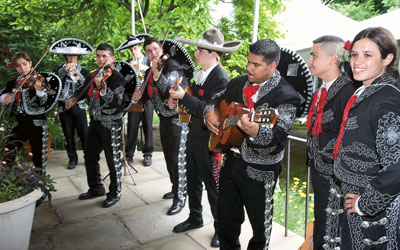¡Viva el mariachi! Student fine-tunes his band, Mariachi Fenix
By Josh SchonwaldNews Office
 | |
If you hear the unmistakably cheery sound of Mexican music wafting out of dorm rooms or practice rooms this spring, you can thank second-year Alejandro Flores—and President Randel.
When Flores came to Chicago in 2003 as a first-year, he never gave a thought to starting a mariachi band, let alone performing for heads of state.
But in October 2003, the Houston native had an unusual experience. Lounging in his dorm room in Breckinridge, Flores was listening to a recording of a popular mariachi band called Mariachi Vargas de Tecalitlan, when a neighbor entered his room and asked, “‘What kind of music is that?’ I told him that’s mariachi. He’d never heard of mariachi,” says Flores.
For Flores, who grew up in a predominantly Mexican neighborhood, mariachi music was a routine part of life. It occurred to him that he was in a new place. “Though many studied the language and ate the food, few people on campus knew about the Mexican mariachi sound.”
So later that fall, Flores, who played violin in high school, began his quest to assemble the University’s first-ever mariachi band. He placed an ad in the Chicago Maroon, he posted notices on bulletin boards, and he e-mailed, he says, “pretty much every list serve on campus, including the Organization of Latin American Students, Minority Graduate Students, the Organization of Black Students and the Law School’s Latino Law Students Association.”
After his aggressive recruiting, Flores had the core membership of his band, having found guitarists, violinists and singers. Some had experience with Mexican music while others, though musicians, had never tried mariachi. The group started practicing informally. Flores, a mariachi newcomer himself, e-mailed professional mariachi bands to ask for music. “They were incredibly helpful,” he says. One of the groups who sent him a song was Mariachi Las Campanas de Mexico. “We would play the music, then listen to the professionals to see how well we were doing.”
They named their band Mariachi Fenix, picked their first song, “El Son de la Negra,” and started practicing. The goal, at first, says Flores, was simply to play on campus. The big event: the Organization of Latin American Students’ Culture Show. For weeks in advance, the group practiced three times a week. Then Flores needed to take care of another need for any self-respecting mariachi band. Mariachis, Flores says, are more than just music. He had to outfit the band members. Over spring break, he drove from Houston across the border and bought used mariachi uniforms for $300 in Matamoros, Mexico.
The first Mariachi Fenix performance was “a learning experience,” Flores says. “You have to play, sing and walk in mariachi. It’s not easy.” And, reflecting on the first performance, Flores notes, “In true U of Chicago fashion, we managed to pick one of the more difficult songs.” But the band kept practicing. Mariachi Fenix grew to 14 members before its many other performances, including at a conference, “Consolidating Democracy in Mexico,” with various Mexican dignitaries. “We were getting better,” Flores says. “We looked good.”
But there was one missing element. “We didn’t have a crucial instrument,” says Flores. A six-string bass, the guitarron is the heartbeat of any mariachi band. Mariachi Fenix had found Olaf Saldivar, who was then the lead singer and agreed to learn to play the guitarron. “We needed to have it,” Flores says. “Every mariachi band must have a guitarron.” The only obstacle was that a decent guitarron would cost at least $900.
Enter President Randel. Flores had e-mailed Randel, knowing he was a musicologist and a music enthusiast, hoping that he might know how the band could get a guitarron. “I was shocked when I heard back from his secretary,” says Flores. “He wanted to meet with me.” Flores explained the band’s needs, and Randel responded, pulling out his personal checkbook.
What was even more extraordinary than getting a guitarron personally funded by the President of the University was what happened later that week. Flores received another e-mail from Randel’s office, asking if Mariachi Fenix could perform at a June event that would honor the naming of the University’s Mexican Studies Center after Freidrich Katz, the Morton D. Hull Distinguished Service Professor Emeritus in History.
The e-mail also mentioned that the event, which would take place at President Randel’s residence, would include a special guest—Vicente Fox, President of Mexico.
Flores was floored. “It’s a once-in-a-lifetime opportunity,” he says. “Playing in front of Vicente Fox. I also was terrified, thinking about how much mariachi music he’s heard. He’s heard the best.”
Though Fox’s visit followed graduation, many of the band’s members flew back for this rare opportunity. To prepare for their audience, the band members increased their practice schedule. “We played nine hours the day before he came,” says Flores.
The event went much better than Flores had hoped. “He [Fox] seemed to really enjoy it,” Flores says.
The event also was broadcast on numerous local television and radio stations, including WMAQ-TV, WLS-TV, Telemundo, WBBM-AM, Channel 2, Channel 5, Fox 32 and Univision.
While Mariachi Fenix has not performed for any heads of state since last June, the group has continued to perform at events throughout Chicago. Most recently they performed at the annual University event to honor Cesar Chavez. They even added a new feature to their shows. The Baile Folklorico, which performs Mexican folk dancing, now regularly accompanies Mariachi Fenix.
The group has grown, but Flores already is thinking to the future. Many of the core members, including the guitarron player, will graduate this year. “It’s very important that we recruit,” he says. “My biggest goal is for Mariachi Fenix to continue after I leave.”
![[Chronicle]](/images/sidebar_header_oct06.gif)